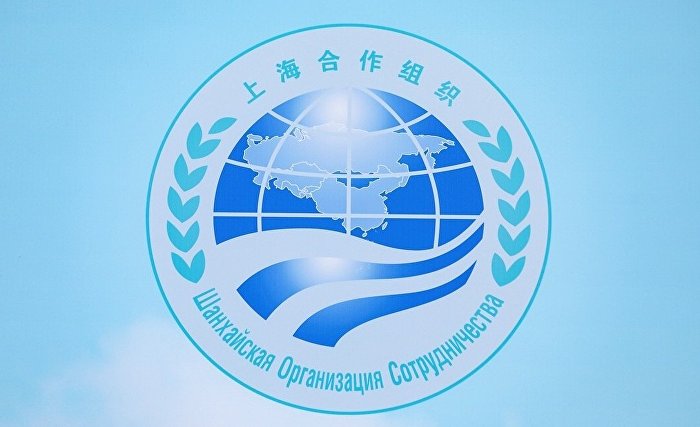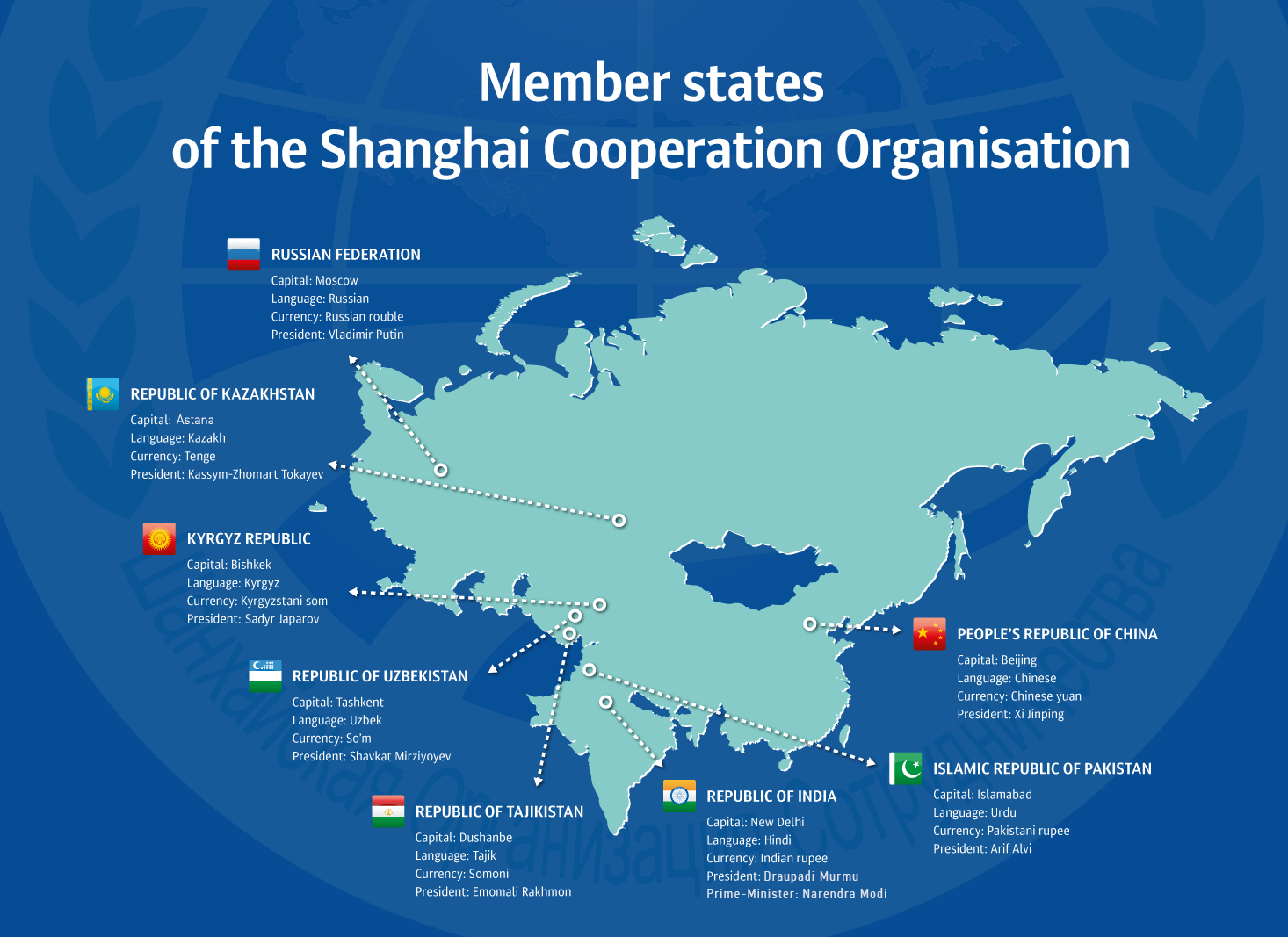The Shanghai Cooperation Organisation (SCO)focuses on cooperation with international and regional organisations.

The Shanghai Cooperation Organization is an intergovernmental organization founded in Shanghai on 15 June 2001.
The SCO currently comprises eight Member States (China, India, Kazakhstan, Kyrgyzstan, Russia, Pakistan, Tajikistan and Uzbekistan), four Observer States interested in acceding to full membership (Afghanistan, Belarus, Iran, and Mongolia) and six “Dialogue Partners” (Armenia, Azerbaijan, Cambodia, Nepal, Sri Lanka and Turkey).
In 2021, the decision was made to start the accession process of Iran to the SCO as a full member, and Egypt, Qatar as well as Saudi Arabia became dialogue partners.
Since its inception in 2001, the SCO has mainly focused on regional security issues, its fight against regional terrorism, ethnic separatism and religious extremism. To date, the SCO’s priorities also include regional development.

The current legal framework of the SCO's foreign relations consists of the following documents (in chronological order):
1. Memorandum of Understanding between the Secretariat of the Shanghai Cooperation Organisation and the Executive Committee of the Commonwealth of Independent States (Beijing, 12 April 2005);
2. Memorandum of Understanding between the Secretariat of the Shanghai Cooperation Organisation and the Secretariat of the Association of Southeast Asian Nations (Jakarta, 21 April 2005);
3. Memorandum of Understanding between the Secretariat of the Shanghai Cooperation Organisation and the Secretariat of the Collective Security Treaty Organisation (Dushanbe, 5 October 2007);
4. Memorandum of Understanding between the Secretariat of the Shanghai Cooperation Organisation and the Secretariat of the Economic Cooperation Organisation (Ashgabat, 11 December 2007);
5. Joint Declaration on Cooperation between the Secretariat of the Shanghai Cooperation Organisation and the United Nations Organisation (Tashkent, 5 April 2010);
6. Memorandum of Understanding between the Secretariat of the Shanghai Cooperation Organisation and the UN Office on Drugs and Crime (Astana, 14 June 2011);
7. Memorandum of Understanding between the Secretariat of the Shanghai Cooperation Organisation and the Secretariat of the UN Economic and Social Commission for Asia and the Pacific (Zhengzhou, 15 December 2015);
8. Memorandum of Understanding between the Secretariat of the Shanghai Cooperation Organisation and the Secretariat of the Conference on Interaction and Confidence-Building Measures in Asia (Shanghai, 20 May 2014);
9. Memorandum of Understanding between the Secretariat of the Shanghai Cooperation Organisation (SCO) and the International Committee of the Red Cross (ICRC) (Astana, 9 June 2017).
Cooperation with the United Nations
On 2 December 2004, the 59th plenary session of the UN General Assembly adopted Resolution А/RES/59/48 (agenda item 151) entitled "Observer status for the Shanghai Cooperation Organisation in the General Assembly." The resolution provided the SCO with the right to participate in the sessions and work of the General Assembly as an observer.
The Organisation maintains regular information contacts with the UN Secretariat and the UN institutions represented in Beijing. Traditionally, high-ranking representatives of the UN attend annual SCO summits upon the invitation of the country holding SCO's current presidency.
On 18 December 2009, the 65th plenary meeting of the 64th session of the UN General Assembly adopted Resolution А/RES/64/183 (agenda item 124) "Cooperation between the United Nations and the Shanghai Cooperation Organisation." The resolution stresses the importance of improving the dialogue, cooperation and coordination between the UN system and the SCO.
On 5 April 2010, the SCO Secretary-General and the UN Secretary-General signed a Joint Declaration on Cooperation between the Secretariats of the SCO and the UN, in Tashkent. The declaration, among other points, stated the intention of the parties to expand cooperation in communications and information exchange.
On 13 December 2010, the 64th plenary meeting within the 65th session adopted Resolution A/RES/65/124 on "Cooperation between the United Nations and the Shanghai Cooperation Organisation" (agenda item 122v) that added to the preliminary agenda for the 67th session of the UN General Assembly an item entitled "Cooperation between the United Nations and the Shanghai Cooperation Organisation." (The agenda of the 66th session, September 2011 — September 2012, did not include discussion of the UN's cooperation with international and regional organisations.)
In September 2012, a delegation of the SCO Secretariat led by the Deputy Secretary General attended the opening of the 67th session of the UN General Assembly in New York.
On 19 November 2012, the 40th plenary meeting of the 67th session of the UN General Assembly adopted Resolution A/RES/67/15 "Cooperation between the United Nations and the Shanghai Cooperation Organisation" (agenda item 121u) that included a sub-item entitled "Cooperation between the UN and the SCO" in the item "Cooperation between the UN and regional and other organisations" of the preliminary agenda of the upcoming 69th session of the UN General Assembly.
Upon requests of the UN, the SCO Secretariat together with the member states and the RATS Executive Committee prepare reports on the fulfillment of certain UN General Assembly resolutions, on a regular basis.
The SCO has established close ties with UN divisions, including the United Nations Office on Drugs and Crime (UNODC) and the Economic and Social Commission for Asia and the Pacific (UNESCAP).
In June 2011 in Astana, the SCO Secretary General and the UNODC Executive Director signed the Memorandum of Understanding between the SCO Secretariat and the UNODC.
On 21 August 2012, the SCO Secretariat signed the Memorandum of Understanding between the SCO Secretariat and the Secretariat of the Economic and Social Commission for Asia and the Pacific.
A Memorandum of Understanding between the SCO Secretariat and the CIS Executive Committee was signed on 12 April 2005.
The document identifies priority areas of cooperation, such as security (ensuring regional and international security, countering terrorism, extremism, separatism, drug and arms trafficking, organised and transnational crime), the economy (trade, terms and conditions for promoting goods, services and finance, promoting and protecting investment, transport and communications, environmental protection, information technology, and tourism) and the humanitarian sphere (culture, education, science, and healthcare).
Regular contacts are maintained at the level of heads of executive bodies. Consultations are held at the level of experts of the SCO Secretariat and the CIS Executive Committee on various aspects of economic, cultural, humanitarian and information cooperation within the SCO and the CIS, as well as on combating modern threats and challenges.
A Memorandum of Understanding between the secretariats of the SCO and ASEAN was signed in Jakarta on 21 April 2005.
The document identifies priority areas of cooperation such as combating terrorism, drug and arms trafficking, money laundering, and illegal migration. Other possible areas of cooperation are outlined, such as the economy and finance, energy, including hydropower and biofuels, tourism, environment and natural resources, and social development.
A Memorandum of Understanding between the secretariats of the SCO and the CSTO was signed in Dushanbe on 5 October 2007.
The document outlines points of agreement regarding the establishment and development of relations of equal and constructive cooperation between the secretariats of the SCO and the CSTO in ensuring regional and international security and stability; countering terrorism; fighting drug trafficking; disrupting arms trafficking; combating organised transnational crime; and other areas of mutual interest.
A Memorandum of Understanding between the Secretariat of the Shanghai Cooperation Organisation and the Secretariat of the Economic Cooperation Organisation was signed in Ashgabat on 11 December 2007.
The document notes that the parties will cooperate by sharing information and positive experience in the spheres of the economy and trade, transport, energy, environment, tourism, and other areas of mutual interest.
A Memorandum of Understanding between the Secretariat of the Shanghai Cooperation Organisation and the Secretariat of the Conference on Interaction and Confidence-Building Measures in Asia was signed in Shanghai on 20 May 2014.
The SCO and the CICA take similar approaches to today's fundamental issues, such as settling regional conflicts, strengthening core non-proliferation regimes, and searching for joint responses to the current challenges, such as terrorism, separatism, extremism, drug trafficking, transnational crime, and arms trafficking.
On 9 June 2017, the Shanghai Cooperation Organisation (SCO) Secretariat and the International Committee of the Red Cross (ICRC) signed a memorandum of understanding on the sidelines of the SCO Heads of State Council Meeting in Astana. The document was signed by SCO Secretary-General Rashid Alimov and ICRC Vice President Christine Beerli.
The memorandum declares that the parties will maintain a dialogue on issues related to international humanitarian law (IHL) applicable only to armed conflicts; help implement IHL norms and other international legal documents; circulate legal information about the IHL and its implementation; develop a dialogue in the humanitarian sphere; and organise events to prevent and respond to emergencies.
The parties will also cooperate in law enforcement, education and healthcare by regularly exchanging information, legal documents and recommendations on issues of mutual interest. They will also cooperate drafting and implementing joint projects and programmes.